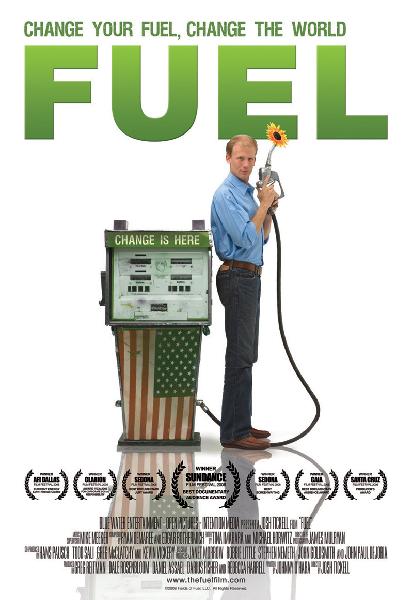Expanded from a report back written for the Pasadena Post Carbon Group
I thought Fuel was very well-made, important, and informative--there's a lot to absorb. I don't agree with every point of view expressed in the film, but I realize the movie has to communicate to diverse people.
My only criticism is that it doesn't seem to address fundamental changes which (I think) are necessary in our lifestyles. Many of the ideas seem to deal with how we can maintain something resembling our current way of life. (Although, at one point the filmmaker mentions that we need to reevaluate our place in nature and to stop thinking of Earth as an object but as a living organism--but I think this needed more emphasis.)
In my opinion, even IF we can deal with global warming significantly, and even IF we can implement alternative fuel sources, we collectively would continue our wholesale assault on the environment in so many other ways—unless fundamental changes are made to our lifestyles.
I also disagree with various speakers who say that the U.S. was once great and can be great again. Sure, the U.S. seems to have inspired European countries--but not always in benevolent ways. Our profoundly evil history of genocide against indigenous people was, I'm sure, a wet dream for Hitler (he was inspired by our forced relocations of the Navajo and Hopi of the 1860s (see:
http://www.youtube.com/watch?v=zs2DXHUKASA). And our foreign policy has always been genocidal(1), and racism, which has has always been with us, remains alive and well.
Still, the movie features a lot of provocative ideas like vertical farms (skyscraper-like farms that would exist in the middle of cities and other places where space is scarce), and there is some great historical information. For example, details of Rudolf Diesel's sudden and very suspicious death is discussed as well as the long and insidious history of Standard Oil (which was broken up 100 years ago but is now reunited as Exxon-Mobil)(2). Also, a compelling case is made that Prohibition was really about stopping a car that Ford put out that ran on ethanol. As soon as Ford gave up on this car, Prohibition was lifted.
The movie made me even more nostalgic for the Jimmy Carter era. There's footage of the ceremony where the--very short-lived--solar panels are installed on the roof of the White House, and Carter's incentives for fuel efficiency is contrasted with the Reagan era. (I'm not trying to say that Carter was a saint--had he manifested much saintliness as president, I don't think he would have lived long.)
I was glad to see depictions of monorails in the film (though they're never discussed). I think they could be a solution to some of our problems (at least until our population crisis is dealt with--if it is ever dealt with), as they have been in other countries for a century. But sadly, I don't see them being implemented in this country outside of theme parks and resort areas. The opposition to them is massive and ruthless--as was demonstrated in Seattle circa the '90s/early 2000s when an extensive monorail system was planned there. Still, I don't think the concept should be abandoned.
I don't how much longer Fuel will be playing here in So Cal. At the time of this writing, it has already left Beverly Hills but is still playing at the Sana Monica Promenade (see:
http://thefuelfilm.com/). It will be opening in other parts of the country in the coming weeks.
-----
(1)Just one of the seemingly countless examples is, of course, the 200,000 Guatemalans who died so we could have inexpensive bananas (vis-a-vis United Fruit, now Chiquita).
(2)I feel like I'll never stop learning of atrocities committed by Standard Oil/Exxon-Mobil throughout history, from its role in dismantling trolley systems in this country to the numerous interventions in other countries, many of them documented in Eduardo Galeano's book The Open Veins of Latin America.

